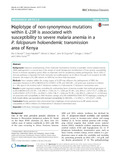| dc.contributor.author | Munde, Elly O. | |
| dc.contributor.author | Raballah, Evans | |
| dc.contributor.author | Okeyo, Winnie A. | |
| dc.contributor.author | Ong’echa, John M. | |
| dc.contributor.author | Perkins, Douglas J. | |
| dc.contributor.author | Ouma, Collins | |
| dc.date.accessioned | 2021-07-06T09:09:57Z | |
| dc.date.available | 2021-07-06T09:09:57Z | |
| dc.date.issued | 2017-04-20 | |
| dc.identifier.uri | https://doi.org/10.1186/s12879-017-2404-y | |
| dc.identifier.uri | https://bmcinfectdis.biomedcentral.com/articles/10.1186/s12879-017-2404-y | |
| dc.identifier.uri | http://r-library.mmust.ac.ke/123456789/1745 | |
| dc.description.abstract | Background
Improved understanding of the molecular mechanisms involved in pediatric severe malarial anemia (SMA) pathogenesis is a crucial step in the design of novel therapeutics. Identification of host genetic susceptibility factors in immune regulatory genes offers an important tool for deciphering malaria pathogenesis. The IL-23/IL-17 immune pathway is important for both immunity and erythropoiesis via its effects through IL-23 receptors (IL-23R). However, the impact of IL-23R variants on SMA has not been fully elucidated.
Methods
Since variation within the coding region of IL-23R may influence the pathogenesis of SMA, the association between IL-23R rs1884444 (G/T), rs7530511 (C/T), and SMA (Hb < 6.0 g/dL) was examined in children (n = 369, aged 6–36 months) with P. falciparum malaria in a holoendemic P. falciparum transmission area.
Results
Logistic regression analysis, controlling for confounding factor of anemia, revealed that individual genotypes of IL-23R rs1884444 (G/T) [GT; OR = 1.34, 95% CI = 0.78–2.31, P = 0.304 and TT; OR = 2.02, 95% CI = 0.53–7.74, P = 0.286] and IL-23R rs7530511 (C/T) [CT; OR = 2.6, 95% CI = 0.59–11.86, P = 0.202 and TT; OR = 1.66, 95% CI = 0.84–3.27, P = 0.142] were not associated with susceptibility to SMA. However, carriage of IL-23R rs1884444T/rs7530511T (TT) haplotype, consisting of both mutant alleles, was associated with increased susceptibility to SMA (OR = 1.12, 95% CI = 1.07–4.19, P = 0.030).
Conclusion
Results presented here demonstrate that a haplotype of non-synonymous IL-23R variants increase susceptibility to SMA in children of a holoendemic P. falciparum transmission area. | en_US |
| dc.language.iso | en | en_US |
| dc.publisher | BMC Infectious Diseases volume | en_US |
| dc.subject | Haplotype , non-synonymous, mutations, IL-23R , associated, susceptibility,severe, malaria, anemia , P. falciparum, holoendemic, transmission | en_US |
| dc.title | Haplotype of non-synonymous mutations within IL-23R is associated with susceptibility to severe malaria anemia in a P. falciparum holoendemic transmission area of Kenya | en_US |
| dc.type | Article | en_US |

